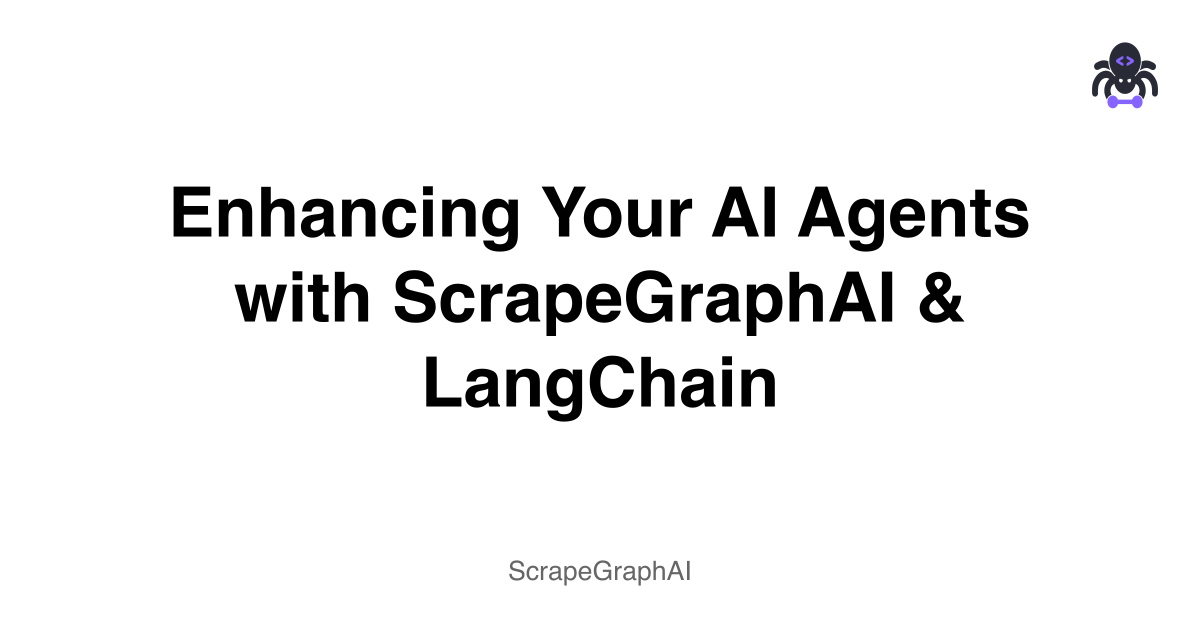Enhancing Your AI Agents with ScrapeGraphAI & LangChain: Advanced Prompt Examples
In today's rapidly changing world, relying on static data is not enough. AI agents must be able to fetch live, relevant, and structured data from the web in real time. ScrapeGraphAI and LangChain together form a powerful combination to bring this capability to life. With LangChain's orchestration and ScrapeGraphAI's prompt-based intelligent scraping, developers can now build agents that think, act, and fetch.
This guide walks through setting up LangChain agents that utilize ScrapeGraphAI to perform real-time web scraping tasks, including dynamic data extraction, intelligent structuring via LLMs, and integrated reasoning. We'll also explore prompt engineering, schema definition, real examples, configuration tips, and measurable accuracy improvements.
Why Combine ScrapeGraphAI and LangChain?
LangChain provides a framework for building AI-powered chains and agents with memory, tools, and external data integrations. ScrapeGraphAI brings language model-powered web scraping capabilities that remove the need for brittle XPath, CSS selectors, or custom scripts.
Combining them results in:
- Agents that retrieve fresh data on-the-fly
- Tools for summarizing or transforming real-time scraped data
- More accurate responses that reflect the current state of the internet
Common Use Cases
- AI assistants retrieving latest stock prices
- Market analysis bots comparing product prices
- Academic research agents gathering fresh government stats
- Customer service bots checking real-time inventory or news
- Live fact-checking tools for journalists
Step 1: Install the SDKs
Use pip to install both libraries:
pip install scrapegraphai
pip install langchainStep 2: Create a ScrapeGraphAI Wrapper as a Tool
We will now build a LangChain tool that wraps ScrapeGraphAI's SmartScraperGraph to scrape a webpage using prompts and return structured output.
from langchain.tools import Tool
from scrapegraphai.graphs import SmartScraperGraph
from scrapegraphai.utils import convert_to_json_schema
def scrape_with_prompt(data):
url = data["url"]
prompt = data["prompt"]
schema = {
"headline": "string",
"summary": "string"
}
graph = SmartScraperGraph(
prompt=prompt,
source=url,
schema=convert_to_json_schema(schema),
config={
"llm": {
"provider": "openai",
"model": "gpt-4",
"api_key": "your-scrapegraph-api-key"
}
}
)
return graph.run()["result"]
scraper_tool = Tool(
name="LiveScraper",
func=scrape_with_prompt,
description="Scrapes web content using prompt + schema with ScrapeGraphAI"
)Step 3: Initialize Agent with Scraper Tool
from langchain.chat_models import ChatOpenAI
from langchain.agents import initialize_agent, AgentType
llm = ChatOpenAI(model="gpt-4", temperature=0)
agent = initialize_agent(
tools=[scraper_tool],
llm=llm,
agent=AgentType.ZERO_SHOT_REACT_DESCRIPTION,
verbose=True
)Step 4: Run Real-Time Scraping with Agent
result = agent.run({
"url": "https://example.com/latest-news",
"prompt": "Extract the latest headline and a short summary"
})
print(result)Advanced Example: Scraping Product Pricing
schema = {
"product_title": "string",
"price": "string"
}
prompt = "Extract product title and price from this product detail page"
graph = SmartScraperGraph(
prompt=prompt,
source="https://example.com/product-page",
schema=convert_to_json_schema(schema),
config={
"llm": {
"provider": "openai",
"api_key": "your-scrapegraph-api-key",
"model": "gpt-4"
}
}
)
result = graph.run()
print(result["result"])YAML-Based Configuration for Reusability
llm:
provider: openai
api_key: YOUR_KEY
model: gpt-4
schema:
product_title: string
price: string
prompt: Extract product title and price
source: https://example.com/productAccuracy Before & After Using ScrapeGraphAI
| Question | Without Real-Time | With ScrapeGraphAI |
|---|---|---|
| What's the latest iPhone price? | Incorrect guess | Live scraped data |
| What's trending on government portal? | No results | Fetched and summarized |
| What's the current weather alert? | Generic output | Live structured info |
Best Practices
- Log all scraped URLs, timestamps, and schemas used
- Use caching to avoid redundant calls to the same site
- Create prompt-schema pairs for reusable scraping agents
- Respect robots.txt and site rate limits
- Handle failures gracefully with fallback messages
- Validate outputs before using them in final answers
Frequently Asked Questions
Can I use it with other LLM providers?
Yes, ScrapeGraphAI supports OpenAI, Groq, Mistral, and others via its flexible configuration.
What happens when the HTML structure changes?
ScrapeGraphAI uses LLMs to adapt to layout shifts and interpret content semantically, unlike brittle CSS selectors.
Can I extract complex tables?
Yes. Define a schema to match table rows and columns, and use prompts that explain what the table represents.
Can I scrape behind authentication?
ScrapeGraphAI is primarily designed for open-access content. Advanced setups can enable browser sessions if needed.
Conclusion
Integrating ScrapeGraphAI with LangChain empowers your AI agents to access, scrape, and structure real-time web data with precision. Whether building research bots, news aggregators, or product monitoring tools, this integration fills the last-mile gap between language understanding and live data retrieval. Let your AI agents not just think—but think with context and data that's current, accurate, and aligned with the real world.
Related Resources
Want to learn more about social media scraping and data extraction? Explore these guides:
- Web Scraping 101 - Master the basics of web scraping
- AI Agent Web Scraping - Learn how AI can enhance social media scraping
- Mastering ScrapeGraphAI - Deep dive into ScrapeGraphAI's capabilities
- X Smart Scraper - Learn about scraping X (Twitter) data
- Facebook Smart Scraper - Guide to Facebook data extraction
- LinkedIn Smart Scraper - Extract data from LinkedIn
- Web Scraping Legality - Understand the legal aspects of social media scraping
- Pre-AI to Post-AI Scraping - See how AI has transformed social media scraping
- LlamaIndex Integration) - Learn how to analyze social media data with LlamaIndex
These resources will help you understand different approaches to social media data extraction and make the most of your scraping efforts.
